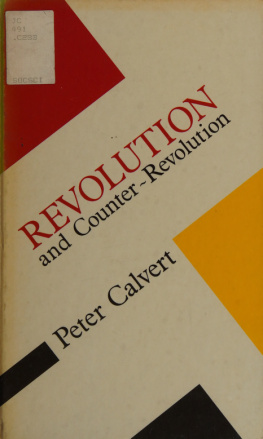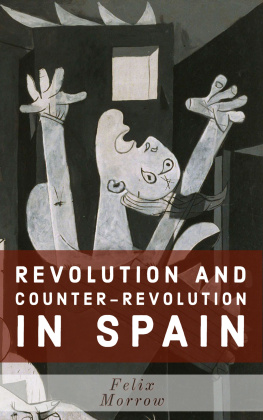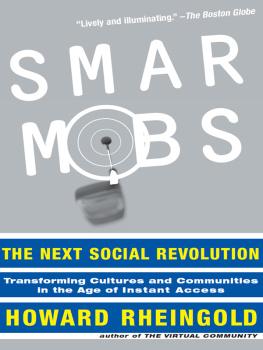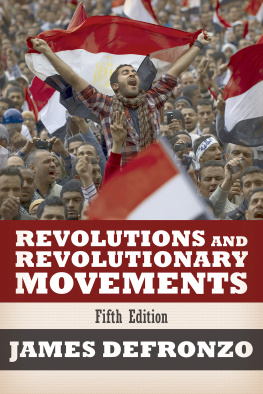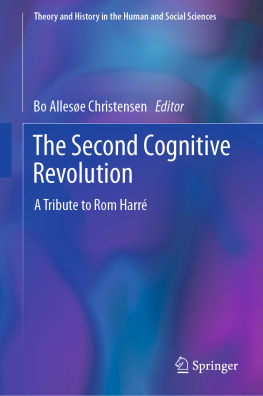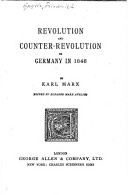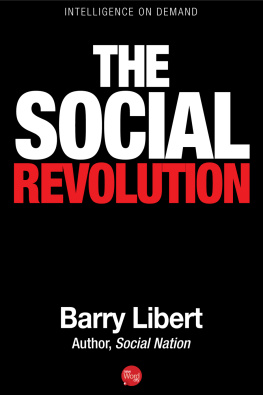
Revolution and counter-revolution
Calvert, Peter
This book was produced in EPUB format by the Internet Archive.
The book pages were scanned and converted to EPUB format automatically. This process relies on optical character recognition, and is somewhat susceptible to errors. The book may not offer the correct reading sequence, and there may be weird characters, non-words, and incorrect guesses at structure. Some page numbers and headers or footers may remain from the scanned page. The process which identifies images might have found stray marks on the page which are not actually images from the book. The hidden page numbering which may be available to your ereader corresponds to the numbered pages in the print edition, but is not an exact match; page numbers will increment at the same rate as the corresponding print edition, but we may have started numbering before the print book's visible page numbers. The Internet Archive is working to improve the scanning process and resulting books, but in the meantime, we hope that this book will be useful to you.
The Internet Archive was founded in 1996 to build an Internet library and to promote universal access to all knowledge. The Archive's purposes include offering permanent access for researchers, historians, scholars, people with disabilities, and the general public to historical collections that exist in digital format. The Internet Archive includes texts, audio, moving images, and software as well as archived web pages, and provides specialized services for information access for the blind and other persons with disabilities.
Created with abbyy2epub (v.1.7.6)
UNIVERSITY OF GUELPH
The Library
SOCSCI JC 491 * CSS3 Calvert , Peter ..
Kc?voila 1l ion snd c: olio t br'V" evo 1 u 11 on
Table caption Date due
> - ^ a |
i 5 09 4 n ~r if |
"103 15 |
92 4 |
** % 7. 3 |
93 0 va |
9 3 08 05 |
fes 12 19 |
9^ 12,0b |
Revolution
and Counter-Revolution
Concepts in the Social Sciences
Series Editor: Frank Parkin
Published titles
Democracy Citizenship Welfare Freedom Bureaucracy Revolution and Counter-Revolution Socialism Liberalism The State Ideology Conservatism Race and Ethnicity Property Status
Anthony Arblaster f. M. Barbalet Norman Barry Zygmunt Bauman David Beetham
Peter Calvert Bernard Crick John Gray
John A. Hall and G. John Ikenberry
David McLellan
Robert Nisbet
John Rex
Alan Ryan
Bryan S. Turner
Concepts in the Social Sciences
Revolution
and Counter-Revolution
*
i
Peter Calvert
Open University Press
Milton Keynes
9 il 119
Open University Press Celtic Court 22 Ballmoor Buckingham MK18 1XW
First Published 1990
Copyright P. A. R. Calvert 1990
All rights reserved. No part of this publication may be reproduced, stored in a retrieval system or transmitted in any form or by any means, without written permission from the publisher.
British Library Cataloguing in Publication Data
Calvert, Peter
Revolution and counter-revolution. - (Concepts in the social sciences)
1. Revolution. Theories I. Title. II. Series 303.6'4'01
ISBN 0-335-15398-4 ISBN 0-335-15397-6 (pbk)
Typeset by Scarborough Typesetting Services
Printed in Great Britain by J. W. Arrowsmith Ltd., Bristol
THE LIBRARY UNIVERSITY OF GUELPH
Contents
Preface | vi |
1 Observation | |
2 Interpretation | |
3 Theorizing | |
Bibliography | |
Index | |
Preface
The principal purpose of this book is to re-examine the place of revolution in modern social theory, and to reassert the need for the systematic study of the social sciences. At a time when major changes are taking place in both the intellectual and the political climate, the one thing that is certain is that the world of the twenty-first century is not going to be as good as some of us hoped twenty years ago. However, with some luck, and the application of our intelligence, it may at least not be as bad as some of us now fear.
What is to be observed?
The more important a term is, the more probable it is that it will be incorrectly used. Most of us, for example, use the term weight when we mean what the physicist would call mass (or the physician obesity). But in the social sciences the problem is particularly serious, since the words we use in everyday life have strong and well-established meanings of their own, and the attempts of social scientists to give them tightly defined meanings are seldom successful. So it is with the term revolution.
In the 1940s there was no problem. There were no revolutions, or rather, there was only one Revolution, and the question was only how soon after the War it would come. Hardly anyone seems to have paid any attention to Katharine C. Chorleys (1943) excellent book on the subject, Armies and the Art of Revolution, perhaps because of the timing of its appearance, perhaps because it included some uncomfortable truths about how people use military force to gain their own ends and how those ends are not always those the masses want.
In the 1950s the Cold War dominated all thought and battle-lines were drawn. On one side, revolution was the hope of change; on the other, it was a fundamental threat to the values of the Free World. At the edges of the conflict, in the emerging Third World, insurgents struggling to free themselves from a colonial domination already on the retreat were caught up in the ideological matrix, and the rival alliances contended to make their struggles their own.
In the 1960s revolution was very fashionable. Everyone was making revolution, or rather, defining whatever they were doing at the time as revolution. Revolution was a warm, yeasty excitement
Revolution and Counter-Revolution
which washed over quite sensible social scientists and left some of them spiritually transformed into bearded political activists. Defining revolution was counter-revolutionary, but writing about it was very fashionable, and a number of useful readers appeared as a result (Davies 1971, Kumar 1971, Mazlish, Kaledin and Ralston 1971).
In the 1990s revolution is no longer on the political agenda though it flourishes as a socio-technological metaphor. The Left has discovered the relative autonomy of the state and the class isolation of armed forces. America walks tall, rolling back the frontiers of communism, and the frontiers of communism roll back obedient to its command, as in Grenada. But in Afghanistan, as in Iran, do the beneficiaries not seem to be going to the Western civilization or the rational tradition of the Enlightenment (even the term Enlightenment has been hijacked to describe something that looks uncomfortably like pompous obscurantism). Instead we wait to see which particular faction of Islamic fundamentalists is going to come out on top. We are going to need some clear ideas about what is going to happen next, as we may well not like it all that much. From the standpoint of the 1990s we can no longer be sure whether events in Iran and Afghanistan constitute a revolution or a counterrevolution. Clearly we are going to have to clarify what we mean by each of these terms.
Next page
